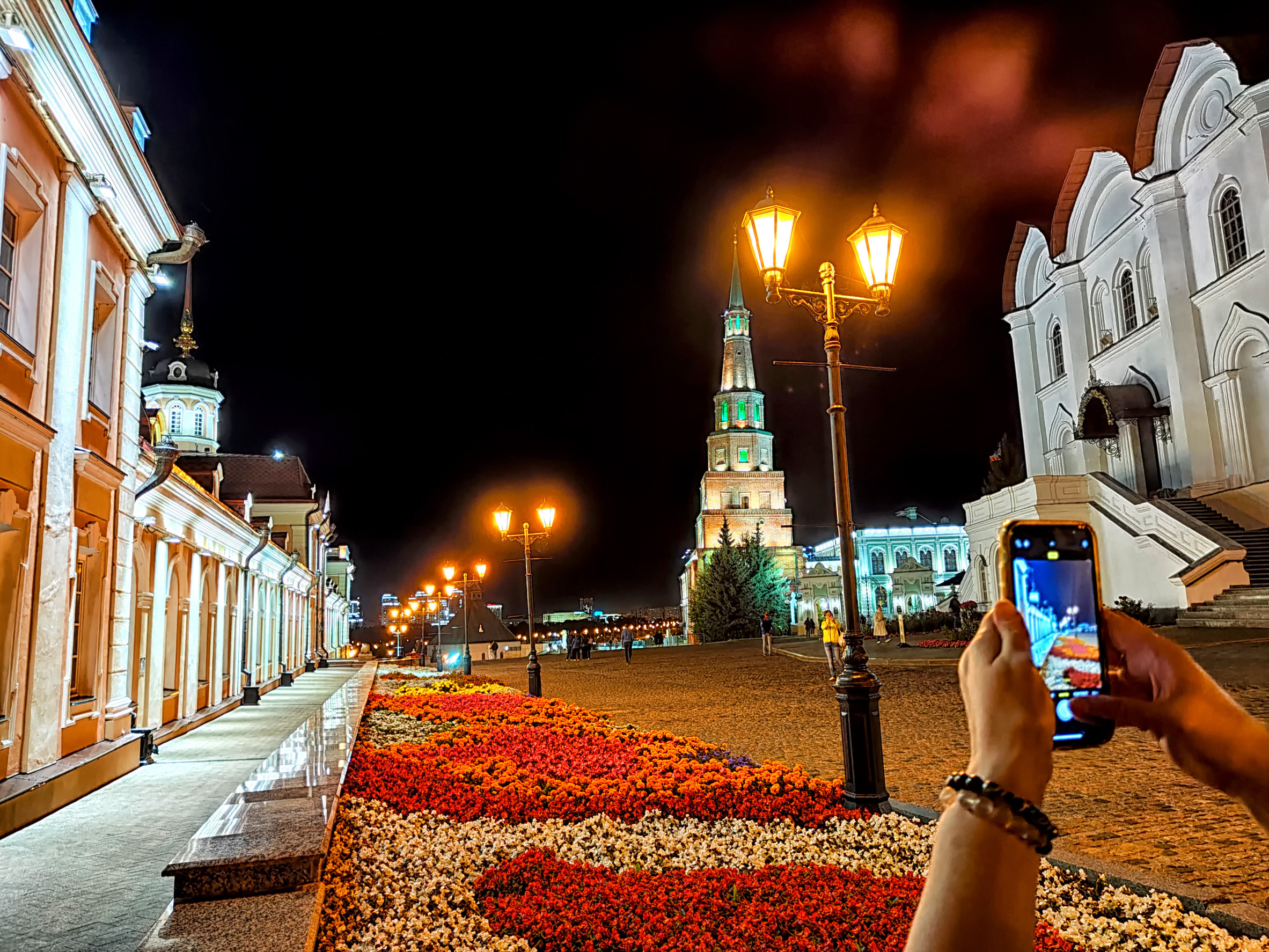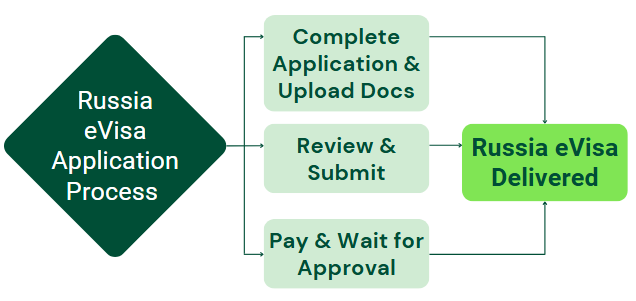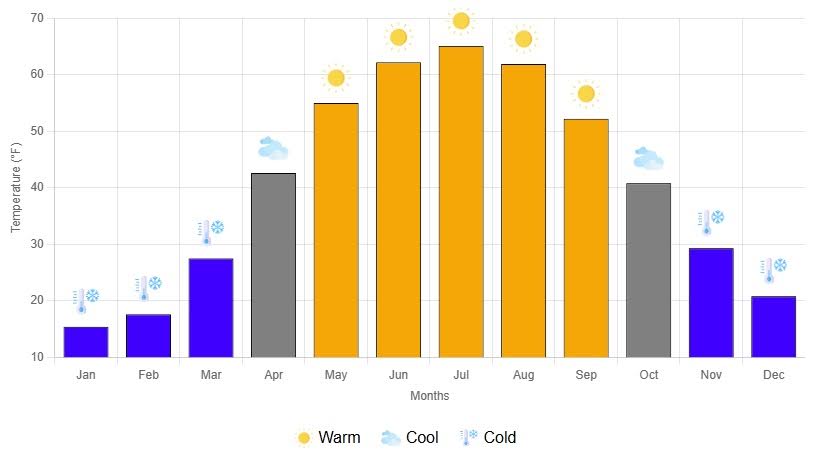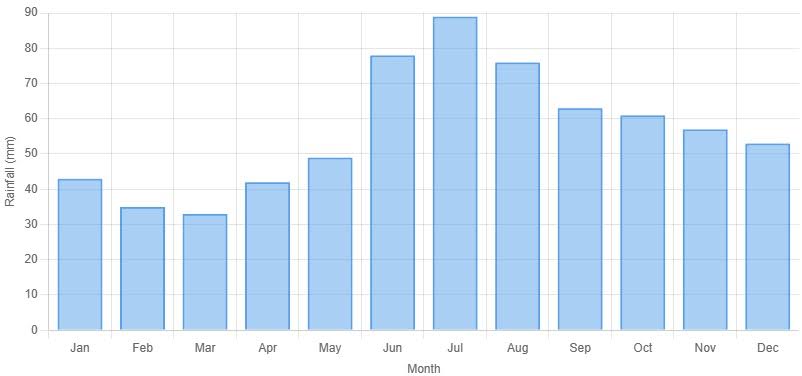
Russia, the largest country in the world, offers a wide range of climates, from the snowy landscapes of Siberia to the milder weather in cities like Moscow. The best time to visit depends on the experience you are seeking—whether it is enjoying the summer warmth or embracing the winter chill. Because of the Russia eVisa, it is easier than ever to explore this diverse climate. Simply fill out the Russia eVisa Application form to begin your adventure in this fascinating country, no matter the season.
The Russia eVisa is available for citizens of eligible countries. The application requires just minimal personal information and documents. Given below are the 3 easy steps to complete the Russia eVisa application process.

Please provide your personal information and passport details, such as your date of birth, name, and the validity or expiry dates of your passport. After you finish the form, please upload the necessary documents:
Note: For detailed information on required documents, visit the Russia eVisa Document Requirements page.
Make sure to review the e-Visa application thoroughly before you hit that submit button. Ensure that all details are accurate and thorough, and verify that all necessary documents are uploaded in the appropriate format.
Use a credit or debit card to finish the e-visa payment process. A confirmation email will be sent to the email address you provided once the payment has cleared. Await the approval of the visa application.
|
Key Information If you choose standard processing, your Russian eVisa will be delivered within 9-11 working days. However, if you are in a hurry or have an urgent need, you can select the "super-rush processing" option when filling out your application. This will speed things up, and your eVisa should be processed within 5-7 working days. Just keep in mind that super-rush processing comes with an additional fee. |
If you are planning to visit Russia, it is essential to understand its unique climate and seasons. Russia provides various experiences all year round with its chilly winters and scorching summers. Here is a simple guide to help you decide when to go:
Let's look at each element in greater depth to help you decide when to visit Russia. We will break down everything from rainfall to temperatures and seasonal activities so you can plan your vacation with confidence.
The chart shows average temperatures in Russia each month. January, February, and December are freezing, shown by blue bars with snowflakes. March is cold (blue), April is cool (grey), and May is warm (orange). Temperatures gradually increase from March to May.
Orange bars with sun symbols represent the hottest months, from June to August, when temperatures exceed 60°F. Temperatures begin to drop from September to November as autumn sets in—September is warm, October is mild, and November becomes cold. The chart clearly shows Russia’s long, harsh winters and short, mild summers.

The graph shows Russia's average monthly rainfall. There is moderate rainfall in winter and early spring, with 30 to 50 mm from January to April. Rainfall increases in late spring, peaking in July at over 80 mm. August also sees high rainfall. After September, rainfall decreases but remains steady through autumn and winter. Cloud symbols represent consistent rainfall year-round, with the most precipitation during the summer months.

Russia’s weather varies greatly throughout the year, offering everything from snowy winters to vibrant festivals. Planning around the weather will help you make the most of your visit.
January and February bring the coldest weather to Russia, with average temperatures around -10°C. Winter nights are long, and the sun rarely appears during the day. If you want to avoid the cold, this might not be the best time to visit Russia.
March brings only slightly higher temperatures in Moscow and St. Petersburg, but the snow remains until the end of the month. If you plan to visit Russia in March, it is wise to pack for both snow and rain. Tourist numbers are still relatively low, so you may have the landmarks to yourself.
As Russia rises from a lengthy winter, April and May are among the best seasons to travel there. Temperatures as high as 15°C make it the perfect place for strolling through the cities and exploring the mediaeval towns in the Golden Ring of Russia. Visitors can appreciate famous sites like Red Square and the Church of Spilt Blood in a more tranquil atmosphere because throngs don't arrive until June.
June to August is the best time to visit Russia, with temperatures reaching up to 30°C in popular tourist areas. This period also kicks off vibrant festivals and events in the cities. Summer is the busiest season, as most tourists visit during these months. If you do not mind the crowds, it is a wonderful time to experience the country’s energy. For fewer crowds, mid-August is a better option.
Fall in Russia is short, with snow starting by the end of October. September and October are a favourable time to visit, with milder weather and fewer tourists. The autumn views are beautiful, but since it is the rainiest season, it is best to bring a raincoat and an umbrella.
November and December come just before the coldest temperatures set in. The days grow shorter during this time, but the weather stays mostly sunny at around 0°C. It is a perfect time to enjoy Russia’s snow-covered landscapes and winter atmosphere.
Be aware of the following before visiting Russia to improve your experience:
| TIP NO. 1 | Russians expect basic courtesy from visitors. If you have the chance, it is a kind gesture to bring a small, thoughtful gift when visiting someone’s home. |
| TIP NO. 2 | No matter how cold it is outside, you should also try to avoid shaking hands without taking off your gloves since it is considered very rude by Russians. Additionally, locals see handshakes across thresholds as suspicious. |
| TIP NO. 3 | Women visiting Russia must cover their heads and wear long skirts when they attend churches. In addition, men should preferably remove their headgear and wear trousers. |
| TIP NO. 4 | Theft and criminal activity are almost nonexistent in Russia throughout the day. However, the hotels where you stay can assist you if you run into such improbable issues. They will assist you in getting to the police. |
| TIP NO. 5 | One meaningful way to express your friendship and appreciation for the nation is by participating in toasts. It is important to steer clear of this, especially when you are going to a local's birthday celebration. |
| TIP NO. 6 | With the exception of summer, almost every season experiences temperatures that hover around the freezing point. So, make sure to pack some warm clothing for your journey. |
Here are some guidelines to help you appreciate it more fully throughout your journey:
To ensure that you are able to communicate effectively, you must be familiar with the following local Russian terms and their English equivalents:
| ENGLISH | RUSSIAN |
|---|---|
| Do you speak English? | Vy govorite po-angliyski? (Вы говорите по-английски?) |
| I do not speak Russian | Ya ne govoryu po-russki (Я не говорю по-русски) |
| How much is the price of this? | Skol'ko eto stoit? (Сколько это стоит?) |
| Can I pay by card? | Kartoy mozhno oplatit'? (Картой можно оплатить?) |
| Thank You | Spasibo (Спасибо) |
| Welcome | Pozhaluysta (Пожалуйста) |
| Excuse me | Izvinite (Извините) |
| Hi | Privet (Привет) |
| Bye | Poka (Пока) |
| Yes | Da (Да) |
| No | Net (Нет) |
| Good | Khorosho (Хорошо) |
| Good evening! | Dobryy vecher (Добрый вечер!) |
| Good night! | Dobroy nochi (Доброй ночи!) |
| How do I get there? | Skazhite pozhaluysta, kak proyti v palatu (Скажите пожалуйста, как пройти в палату?) |
Russia’s large size and different climates offer unique travel experiences all year. Spring and autumn have mild weather and fewer crowds; summer is full of festivals, and winter shows off beautiful snow-covered landscapes. With a simple e-visa process, visiting Russia is now easier than ever.
|
Are you planning to visit Russia? Read our Cool and Unusual Things to Do in Russia guide to get the inside scoop on how to make the most of your trip. |
What should I pack for winter travel in Russia?
Pack warm clothes like thermal layers, a heavy coat, gloves, and boots. Hand warmers and insulated gear will keep you comfortable in the cold.
Is it easy to travel between cities in Russia?
Indeed, the train system links significant cities such as Moscow and St Petersburg. The train ride between these cities provides beautiful views, particularly during the summer and autumn seasons.
Is Russia a year-round travel destination?
Yes, Russia offers different experiences throughout the year. Summer is lively, spring and autumn are mild and less crowded, and winter provides a magical, snow-covered landscape.
Step1: Complete the online application by providing your passport details.
Step2: Submit payment online using a credit card.
Step3: Monitor your email for confirmation of payment and receipt of your eVisa, which will be sent electronically.
1